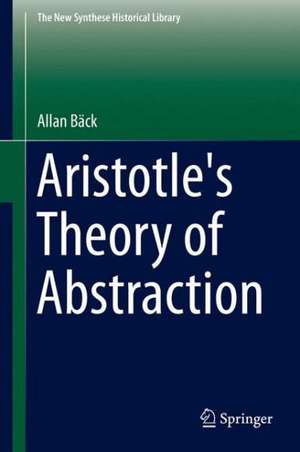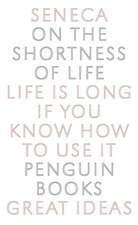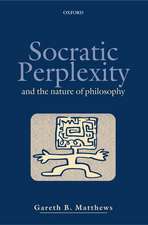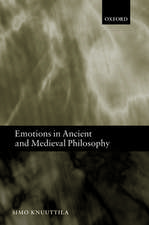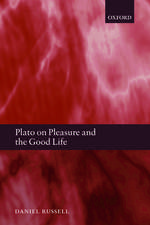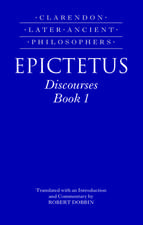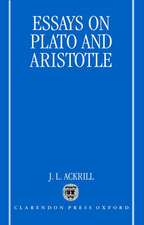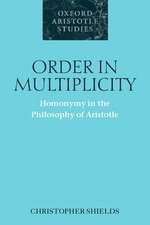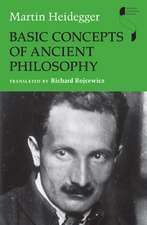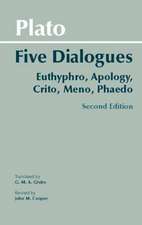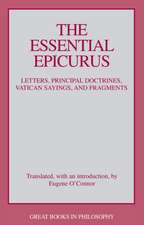Aristotle's Theory of Abstraction: The New Synthese Historical Library, cartea 73
Autor Allan Bäcken Limba Engleză Hardback – 21 iul 2014
Some of the features of Aristotle’s theory of abstraction developed in this book include: abstraction is a relation; perception and knowledge are types of abstraction; the objects generated by abstractions are relata which can serve as subjects in their own right, whereupon they can appear as items in other categories. The author goes on to look at how Aristotle distinguishes the concrete from the abstract paronym, how induction is a type of abstraction which typically moves from the perceived individuals to universals and how Aristotle’s metaphysical vocabulary is "relational.’
Beyond those features, this work also looks at how of universals, accidents, forms, causes and potentialities have being only as abstract aspects of individual substances. An individual substance is identical to its essence; the essence has universal features but is the singularity making the individual substance what it is. These theories are expounded within this book. One main attraction in working out the details of Aristotle’s views on abstraction lies in understanding his metaphysics of universals as abstract objects.
This work reclaims past ground as the main philosophical tradition of abstraction has been ignored in recent times. It gives a modern version of the medieval doctrine of the threefold distinction of essence, made famous by the Islamic philosopher, Avicenna.
| Toate formatele și edițiile | Preț | Express |
|---|---|---|
| Paperback (1) | 562.85 lei 39-44 zile | |
| Springer International Publishing – 3 sep 2016 | 562.85 lei 39-44 zile | |
| Hardback (1) | 573.76 lei 39-44 zile | |
| Springer International Publishing – 21 iul 2014 | 573.76 lei 39-44 zile |
Din seria The New Synthese Historical Library
- 18%
 Preț: 950.52 lei
Preț: 950.52 lei - 18%
 Preț: 949.73 lei
Preț: 949.73 lei - 18%
 Preț: 946.24 lei
Preț: 946.24 lei - 18%
 Preț: 953.82 lei
Preț: 953.82 lei - 20%
 Preț: 1618.07 lei
Preț: 1618.07 lei - 15%
 Preț: 643.00 lei
Preț: 643.00 lei - 18%
 Preț: 955.56 lei
Preț: 955.56 lei - 15%
 Preț: 644.82 lei
Preț: 644.82 lei - 18%
 Preț: 1387.55 lei
Preț: 1387.55 lei - 18%
 Preț: 955.56 lei
Preț: 955.56 lei - 18%
 Preț: 951.47 lei
Preț: 951.47 lei - 15%
 Preț: 637.46 lei
Preț: 637.46 lei - 15%
 Preț: 644.63 lei
Preț: 644.63 lei - 18%
 Preț: 952.72 lei
Preț: 952.72 lei - 15%
 Preț: 644.49 lei
Preț: 644.49 lei - 15%
 Preț: 645.47 lei
Preț: 645.47 lei - 18%
 Preț: 953.82 lei
Preț: 953.82 lei - 18%
 Preț: 958.38 lei
Preț: 958.38 lei - 15%
 Preț: 639.25 lei
Preț: 639.25 lei - 15%
 Preț: 638.89 lei
Preț: 638.89 lei - 18%
 Preț: 953.65 lei
Preț: 953.65 lei - 18%
 Preț: 952.26 lei
Preț: 952.26 lei - 18%
 Preț: 950.52 lei
Preț: 950.52 lei - 18%
 Preț: 1230.66 lei
Preț: 1230.66 lei - 15%
 Preț: 646.11 lei
Preț: 646.11 lei
Preț: 573.76 lei
Preț vechi: 717.20 lei
-20% Nou
Puncte Express: 861
Preț estimativ în valută:
109.82€ • 114.21$ • 92.03£
109.82€ • 114.21$ • 92.03£
Carte tipărită la comandă
Livrare economică 10-15 martie
Preluare comenzi: 021 569.72.76
Specificații
ISBN-13: 9783319047584
ISBN-10: 3319047582
Pagini: 320
Ilustrații: IX, 311 p. 195 illus.
Dimensiuni: 155 x 235 x 25 mm
Greutate: 0.63 kg
Ediția:2014
Editura: Springer International Publishing
Colecția Springer
Seria The New Synthese Historical Library
Locul publicării:Cham, Switzerland
ISBN-10: 3319047582
Pagini: 320
Ilustrații: IX, 311 p. 195 illus.
Dimensiuni: 155 x 235 x 25 mm
Greutate: 0.63 kg
Ediția:2014
Editura: Springer International Publishing
Colecția Springer
Seria The New Synthese Historical Library
Locul publicării:Cham, Switzerland
Public țintă
ResearchCuprins
Preface.- Introduction.- Logic: The Formal Structure of Abstraction.- Chapter 1. The Conception of Abstraction.- Chapter 2. Abstract Relata.- Chapter 3. The Relation of Abstraction.- Science: The Psychological Process of Abstraction.- Chapter 4. Perceiving.- Chapter 5. Thinking.- Chapter 6. The Process of Abstraction.- Metaphysics: Aristotle’s Abstract Ontology.- Chapter 7. The Subject of Metaphysics.- Chapter 8. Aristotle’s Buddhism.- Chapter 9. Parts of Animals.- Chapter 10. Aristotle’s Nominalism.- Appendix.- The Formal Structure of Abstraction.
Textul de pe ultima copertă
This book investigates Aristotle’s views on abstraction and explores how he uses it. In this work, the author follows Aristotle in focusing on the scientific detail first and then approaches the metaphysical claims, and so creates a reconstructed theory that explains many puzzles of Aristotle’s thought. Understanding the details of his theory of relations and abstraction further illuminates his theory of universals.
Some of the features of Aristotle’s theory of abstraction developed in this book include: abstraction is a relation; perception and knowledge are types of abstraction; the objects generated by abstractions are relata which can serve as subjects in their own right, whereupon they can appear as items in other categories. The author goes on to look at how Aristotle distinguishes the concrete from the abstract paronym, how induction is a type of abstraction which typically moves from the perceived individuals to universals, and how Aristotle’s metaphysical vocabulary is "relational.’
Beyond those features, this work also looks at how of universals, accidents, forms, causes, and potentialities have being only as abstract aspects of individual substances. An individual substance is identical to its essence; the essence has universal features but is the singularity making the individual substance what it is. These theories are expounded within this book. One main attraction in working out the details of Aristotle’s views on abstraction lies in understanding his metaphysics of universals as abstract objects.
This work reclaims past ground as the main philosophical tradition of abstraction has been ignored in recent times. It gives a modern version of the medieval doctrine of the threefold distinction of essence, made famous by the Islamic philosopher,Avicenna.
Some of the features of Aristotle’s theory of abstraction developed in this book include: abstraction is a relation; perception and knowledge are types of abstraction; the objects generated by abstractions are relata which can serve as subjects in their own right, whereupon they can appear as items in other categories. The author goes on to look at how Aristotle distinguishes the concrete from the abstract paronym, how induction is a type of abstraction which typically moves from the perceived individuals to universals, and how Aristotle’s metaphysical vocabulary is "relational.’
Beyond those features, this work also looks at how of universals, accidents, forms, causes, and potentialities have being only as abstract aspects of individual substances. An individual substance is identical to its essence; the essence has universal features but is the singularity making the individual substance what it is. These theories are expounded within this book. One main attraction in working out the details of Aristotle’s views on abstraction lies in understanding his metaphysics of universals as abstract objects.
This work reclaims past ground as the main philosophical tradition of abstraction has been ignored in recent times. It gives a modern version of the medieval doctrine of the threefold distinction of essence, made famous by the Islamic philosopher,Avicenna.
Caracteristici
Presents new views on abstraction, a philosophical tradition with Greek and Islamic roots, that has been ignored in recent times Offers a look at how universals, accidents, forms and the like have only the abstract aspects of individual substances Approaches the study of abstraction with a focus on scientific detail before addressing metaphysical claims Includes supplementary material: sn.pub/extras
